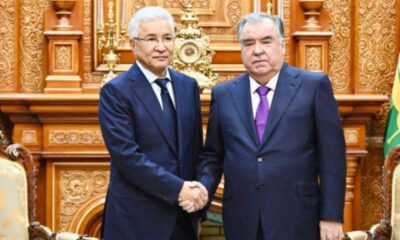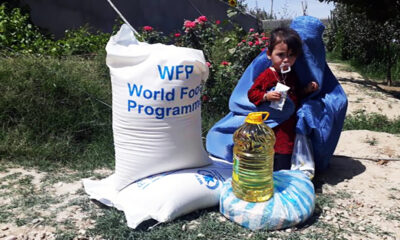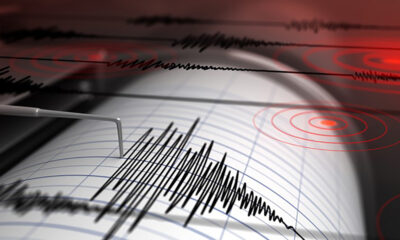World
German Social Democrats beat conservatives in vote to decide Merkel successor

Germany’s Social Democrats narrowly won Sunday’s national election, projected results showed, and claimed a “clear mandate” to lead a government for the first time since 2005 and to end 16 years of conservative-led rule under Angela Merkel.
The centre-left Social Democrats (SPD) were on track for 26.0% of the vote, ahead of 24.5% for Merkel’s CDU/CSU conservative bloc, projections for broadcaster ZDF showed, but both groups believed they could lead the next government.
With neither major bloc commanding a majority, and both reluctant to repeat their awkward “grand coalition” of the past four years, the most likely outcome is a three-way alliance led by either the Social Democrats or Merkel’s conservatives.
Agreeing a new coalition could take months, and will likely involve the smaller Greens and liberal Free Democrats (FDP).
“We are ahead in all the surveys now,” the Social Democrats’ chancellor candidate, Olaf Scholz, said in a round table discussion with other candidates after the vote.
“It is an encouraging message and a clear mandate to make sure that we get a good, pragmatic government for Germany,” he added after earlier addressing jubilant SPD supporters.
The SPD’s rise heralds a swing left for Germany and marks a remarkable comeback for the party, which has recovered some 10 points in support in just three months to improve on its 20.5% result in the 2017 national election.
Scholz, 63, would become the fourth post-war SPD chancellor after Willy Brandt, Helmut Schmidt and Gerhard Schroeder. Finance minister in Merkel’s cabinet, he is a former mayor of Hamburg.
Scholz’s conservative rival Armin Laschet, signalled his bloc was not ready yet to concede, though his supporters were subdued.
“It hasn’t always been the first-placed party that provided the chancellor,” Laschet, 60, told the round table. “I want a government where every partner is involved, where everyone is visible – not one where only the chancellor gets to shine,” he said in an early attempt to woo smaller parties.
Schmidt ruled in the late 1970s and early 1980s in coalition with the FDP even though his Social Democrats had fewer parliamentary seats than the conservative bloc.
Attention will now shift to informal discussions followed by more formal coalition negotiations, which could take months, leaving Merkel in charge in a caretaker role.
Scholz and Laschet both said they would aim to strike a coalition deal before Christmas.
Merkel plans to step down after the election, making the vote an era-changing event to set the future course of Europe’s largest economy.
She has stood large on the European stage almost since taking office in 2005 – when George W. Bush was U.S. president, Jacques Chirac in the Elysee Palace in Paris and Tony Blair British prime minister.
After a domestic-focused election campaign, Berlin’s allies in Europe and beyond may have to wait for months before they can see whether the new German government is ready to engage on foreign issues to the extent they would like.
A row between Washington and Paris over a deal for Australia to buy U.S. instead of French submarines has put Germany in an awkward spot between allies, but also gives Berlin the chance to help heal relations and rethink their common stance on China.
On hearing that the SPD were slightly ahead in polls, U.S. President Joe Biden told reporters in Washington: “I’ll be darned… They’re solid.”
On economic policy, French President Emmanuel Macron is eager to forge a common European fiscal policy, which the Greens support but the CDU/CSU and FDP reject. The Greens also want “a massive expansion offensive for renewables”.
“Germany will end up with a rather weak chancellor who will struggle to get behind any kind of ambitious fiscal reform at the EU level,” said Naz Masraff at political risk consultancy Eurasia.
Whatever coalition ends up in power, Germany’s friends can at least take heart that moderate centrism has prevailed, and the populism that has taken hold in other European countries failed to break through.
The projected results for ZDF showed the far-right Alternative for Germany (AfD) on track for 10.5%, worse than four years ago when they stormed into the national parliament with 12.6% of the vote, and with all mainstream groupings ruling out a coalition with the party.
World
Trump says Ukraine talks may be going OK, but there is a time ‘to put up or shut up’
Trump has shown signs of losing patience and has spoken of imposing secondary sanctions on countries that buy Russian oil if he feels Moscow is dragging its feet on a deal.
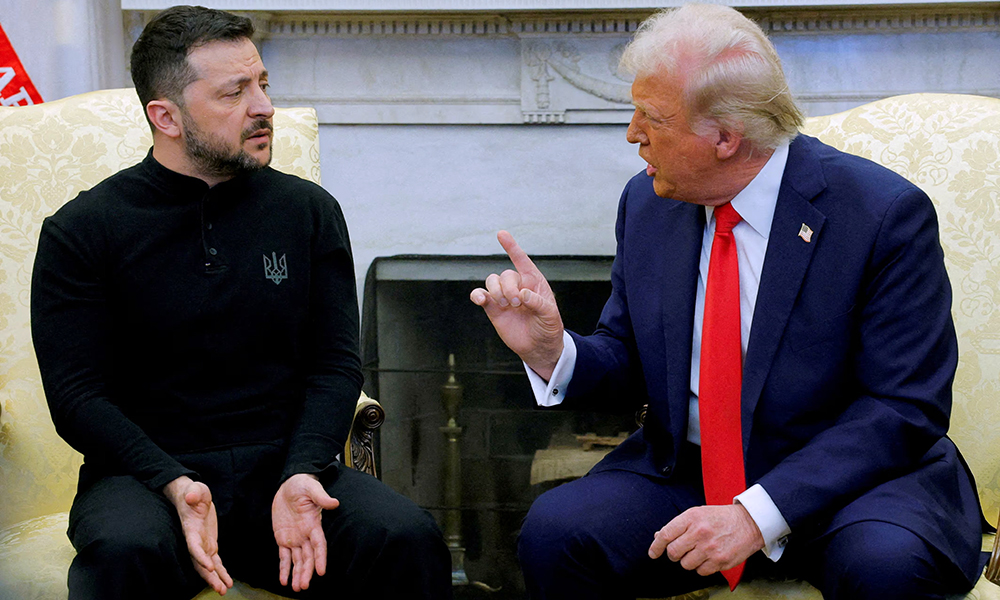
U.S. President Donald Trump said on Saturday that talks aimed at ending the war in Ukraine may be going OK, but “there’s a point at which you just have to either put up or shut up.”
Trump made the comment to reporters a day after he showed frustration with Russia and told it to “get moving” on reaching a deal.
“I think Ukraine-Russia might be going OK, and you’re going to be finding out pretty soon,” Trump told reporters on Air Force One, while adding:
“There’s a point at which you just have to either put up or shut up and we’ll see what happens, but I think it’s going fine.”
On Friday, Trump’s special envoy Steve Witkoff held talks with Russian President Vladimir Putin about the search for a peace deal.
The talks came at a time when U.S.-Russia dialogue aimed at agreeing a ceasefire ahead of a possible peace deal to end the war appeared to have stalled over disagreements around conditions for a full pause in hostilities.
Trump has shown signs of losing patience and has spoken of imposing secondary sanctions on countries that buy Russian oil if he feels Moscow is dragging its feet on a deal.
Earlier on Saturday, Russian Foreign Minister Sergei Lavrov praised Trump for what he said was a better understanding of the Ukraine conflict than any other Western leader.
“When we speak about eliminating root causes of any conflict, including the Ukrainian conflict, this is the only way to resolve the problem and to establish long-lasting peace. Remove root causes,” Lavrov said at the Antalya Diplomacy Forum in southern Turkey.
“President Trump was the first and so far, I think, almost the only one among the Western leaders who repeatedly, with conviction, several times stated that it was a huge mistake to pull Ukraine into NATO. And this is one of the root causes which we quoted so many times.”
Putin, who launched Russia’s invasion of Ukraine in February 2022, has long cast Ukraine’s tilt to the West, including its desire to join NATO, as a threat to Russia.
Commenting on an agreement between Ukraine and Russia to pause strikes on each other’s energy facilities, Lavrov said that Moscow has been keeping its word and accused Kyiv of striking Russian energy infrastructure almost every day.
“I gave to our colleagues from Turkey, to (Foreign) Minister (Hakan) Fidan, what we gave to the Americans, to the U.N., to the OSCE – the list of facts listing the attacks by Ukraine during the last three weeks against Russian energy infrastructure.”
Ukraine has made similar accusations against Russia since the U.S.-backed moratorium was approved.
World
White House says ‘all hell to pay’ should Iran develop nuclear weapon

President Donald Trump wants Iran to know that there will be “all hell to pay” if it does not abandon its nuclear program, his press secretary told reporters on Friday ahead of talks on Saturday between U.S. and Iranian delegations.
White House press secretary Karoline Leavitt said Trump’s “ultimate objective is to ensure that Iran can never obtain a nuclear weapon” and that Trump believes in diplomacy, but that “all options are on the table” if diplomatic efforts fail, Reuters reported.
“But he’s made it very clear to the Iranians, and his national security team will as well, that all options are on the table, and Iran has a choice to make. You can agree to President Trump’s demand, or there will be all hell to pay, and that’s how the president feels. He feels very strongly about it,” Leavitt said.
U.S. special envoy Steve Witkoff is set for talks on Saturday with an Iranian delegation in Oman. Iranian state media said Iran would be represented by Foreign Minister Abbas Araqchi, with Omani Foreign Minister Badr al-Busaidi as intermediary.
Trump in February restored his “maximum pressure” campaign on Iran, which includes efforts to drive its oil exports down to zero, in order to stop Tehran from obtaining a nuclear weapon. He said earlier this week that if the talks are unsuccessful, “Iran is going to be in great danger.”
World
Tourist helicopter crashes into New York’s Hudson River, killing all six aboard
Agustin Escobar, an executive at Germany-based technology company Siemens was among those killed according to the New York Times, which cited unnamed law enforcement sources, Reuters reported.
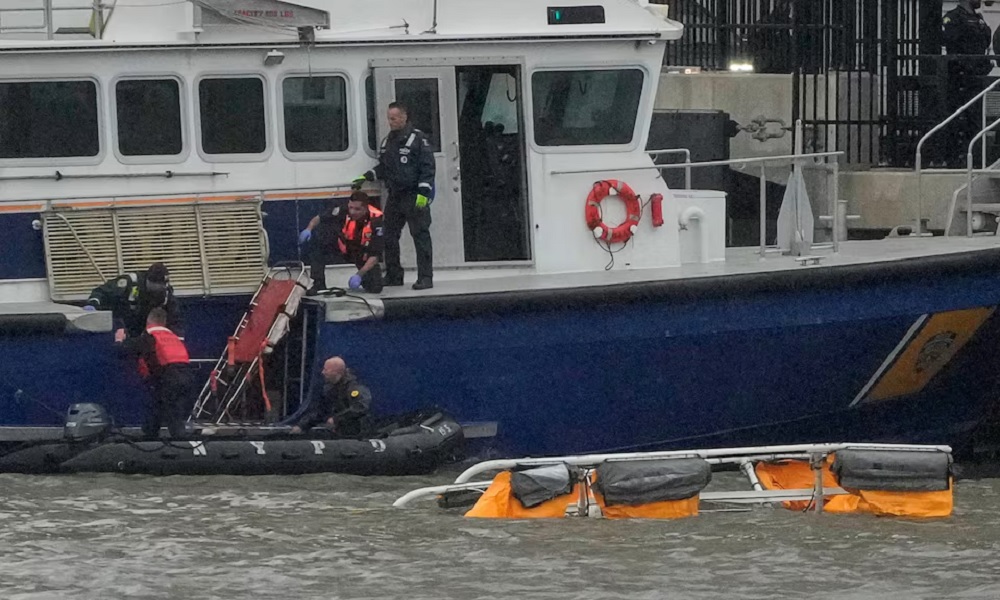
A tourist helicopter plummeted upside down into New York City’s Hudson River on Thursday killing all six people on board, including a Spanish family with three children and the pilot, Mayor Eric Adams said.
Agustin Escobar, an executive at Germany-based technology company Siemens was among those killed according to the New York Times, which cited unnamed law enforcement sources, Reuters reported.
New York City police referred requests for confirmation that Escobar was aboard the helicopter to the U.S. Coast Guard. The Coast Guard said in a statement that it did not yet have the names of the victims. Siemens did not immediately respond to a request for comment outside normal business hours.
Video of the crash showed what appeared to be a large object plunging into the river, followed seconds later by what appeared to be a helicopter blade. Afterwards, emergency and police boats were seen circling around a patch of river where the helicopter was submerged, with only what appeared to be the aircraft’s landing gear poking above the water’s surface.
The Bell 206 chopper, operated by New York Helicopter Tours, departed at about 3 p.m. ET (1900 GMT) from a downtown helicopter pad and flew north over the Hudson River, New York Police Commissioner Jessica Tisch said.
It turned south when it reached the George Washington Bridge and crashed minutes later, hitting the water upside down and getting submerged near Lower Manhattan at around 3:15 p.m., just off Hoboken, New Jersey, Tisch added.
Divers helped remove the victims from the water. Four were pronounced dead at the scene, while two others were taken to area hospitals where they died.
The airspace around Manhattan is crowded with helicopters offering tourists a bird’s-eye view of the sights, with at least two dozen operators listed on tour website Viator. Many of the operators also offer helicopter shuttle services to the area airports.
New York Helicopter Tours, which offers sightseeing flights for as little as $114 per person on its website, did not respond immediately to a request for comment about the crash.
Transportation Secretary Sean Duffy said the tour helicopter was in Special Flight Rules Area established in New York that means no air traffic control services were being provided when it crashed.
The Federal Aviation Administration and the National Transportation Safety Board will investigate, with the NTSB leading the investigation.
Duffy said the FAA was also launching a Safety Review Team on Thursday evening. NTSB Chair Jennifer Homendy and a team from the board will arrive in New York later on Thursday and plan to hold a press briefing on Friday.
New York City has a history of accidents involving helicopters. In 2018, five passengers aboard a helicopter died when it crashed into the East River, while the pilot survived. The helicopter was on a charter flight that featured an open door to allow passengers to take photographs of the skyline.
A New York City Police spokesperson said that police boats had assisted in Thursday’s rescue efforts.
Helicopter safety has been a topic of discussion in the U.S. Congress after 67 people were killed in a crash between an American Airlines regional jet and Army helicopter on Jan. 29 near Reagan National Airport in Washington, D.C. The FAA has since permanently restricted helicopter traffic near that airport and is reviewing helicopter operations near other major airports.
-

 Sport4 days ago
Sport4 days agoAfghanistan win U-19 cricket series despite rain-impacted loss to Nepal
-
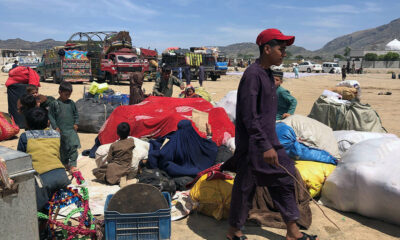
 Latest News5 days ago
Latest News5 days agoPakistan expels thousands of Afghan nationals in fresh drive, says UNHCR
-
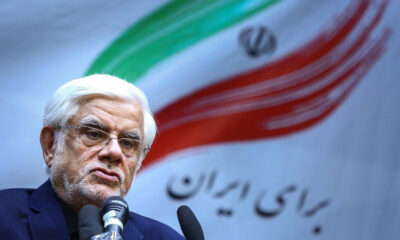
 Latest News5 days ago
Latest News5 days agoIran’s Vice President advocates stronger ties with neighbors, especially Afghanistan
-
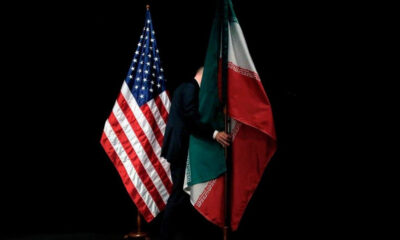
 Regional5 days ago
Regional5 days agoUS energy secretary sees tighter sanctions on Iran without deal
-
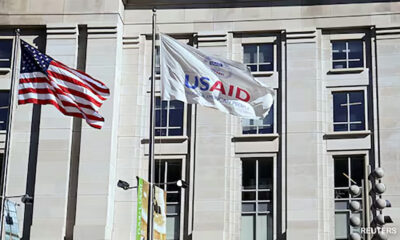
 Latest News5 days ago
Latest News5 days agoTrump administration moves to restore some terminated foreign aid programs, sources say
-
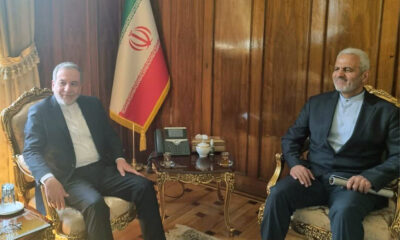
 Latest News5 days ago
Latest News5 days agoBigdeli updates Iran’s FM on current status of bilateral relations with Kabul
-
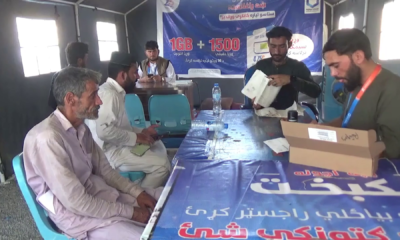
 Latest News4 days ago
Latest News4 days agoAWCC distributes free SIM cards to returning refugees from Pakistan
-

 International Sports5 days ago
International Sports5 days agoIPL 2025: Arya slays CSK for Punjab Kings








